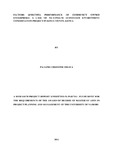| dc.description.abstract | It is widely recognized that Community Owned Enterprises (COEs) play an active role in developing countries as crucial engines for attaining national development goals such as economic growth, poverty alleviation, employment and wealth creation, all in an attempt to achieve a fairer distribution of income and increased productivity. In an effort to step up growth rates in low income countries, particularly in Africa, many development partners and donors have made the backing and development of COEs a major concern. Poor performance in most COEs raises concern among donors, government bodies and other stakeholders who continue to put a lot of resources and effort towards development of COEs (Kerlin 2006). Hence the study assessed the factors affecting performance of COEs, focusing on Mutonguni Ecosystem Environment Conservation Project (MEECP) in Kitui County, Kenya and more specifically its enterprise component, the Kitui County Multi-processor Company Limited (KCMCL). This project is financed by Community Development Trust Fund (CDTF). This study utilized a cross-sectional descriptive research design combining both quantitative and qualitative methods. The study population included direct beneficiaries of the MEECP and representatives from a few stakeholders including CDTF staff, partners of the project, consultants and associates from government departments. Stratified proportionate random sampling technique was used to select the sample. Purposive sampling was adopted to select seven key informants among the stakeholders, while 75 direct community beneficiaries were selected using simple random sampling resulting to a sample size of 82 respondents. Structured questionnaires were administered to the sample. Interviews were further conducted on the seven key informants. The study also utilized secondary data from authoritative printed materials such as journals, books and articles. The internet was explored for information concerning COEs locally and globally. The quantitative data was analysed using Statistical Package for Social Scientists (SPSS) and presented using tables to represent means, standard deviation and frequency distribution. Qualitative data was analysed using conceptual content analysis. In addition, the researcher conducted a Karl Pearson’s Product moment correlation coefficient to ascertain whether a statistical significant relationship exists between the independent variables and the dependent variable. The independent variables in the study are: governance; value chain efficiency; market access and business skills; while the dependent variable is performance of COEs. The study found that there is a strong correlation between the independent variables and performance of KCMCL. Some of the key findings indicate that there are some elements of bad governance at KCMCL, value chain linkage is poor and has a negative effect on value chain efficiency. KCMCL faces market access challenges; they lack market information and have to contend with high transportation costs and they generally have poor business skills. All these affect their performance. The study recommends for governance issues to be addressed. The current structure of KCMCL should be changed it is not well represented and is affecting leadership and decision making process. KCMCL should establish a strong value chain linkage that will lead to value chain efficiency. There is need to hire competent marketing staff, and also do market research from time to time in order to understand customers and markets. Market research will also enable them get reliable market information. The study recommends that KCMCL should train its managers and leaders on business skills, and also consider hiring of competent qualified managers | en |

